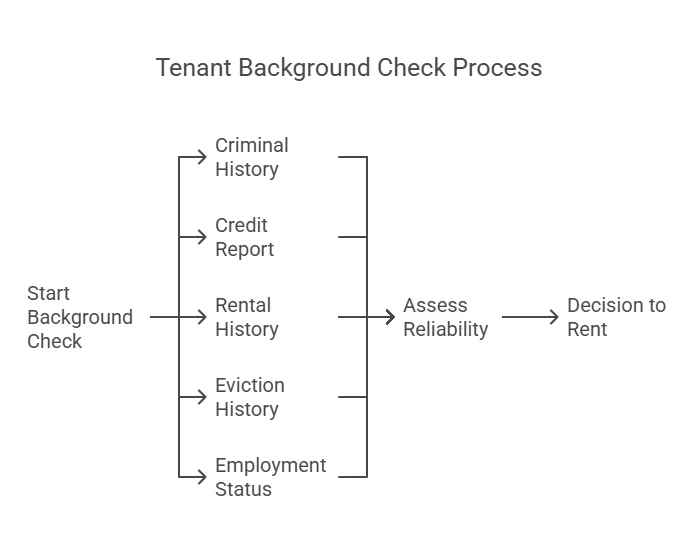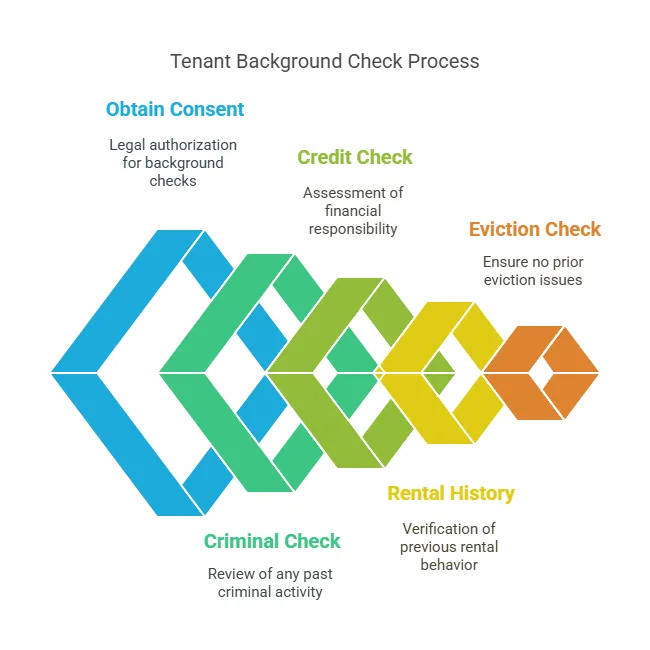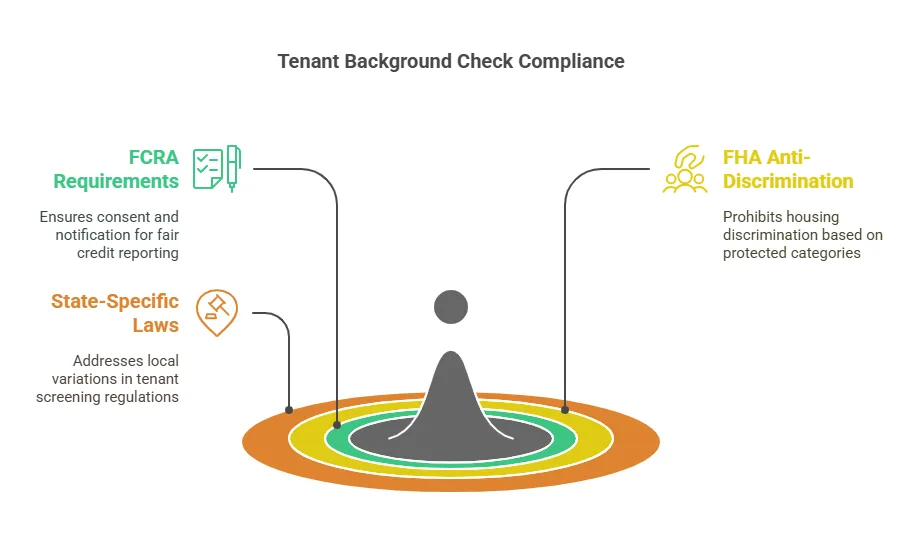Free Resources for Tenant Background Checks

Introduction & Overview of Tenant Background Checks
In the world of rental property management, ensuring that tenants are reliable and trustworthy is paramount. One of the most important steps in vetting potential tenants is conducting a tenant background check. This process provides critical insights into a tenant’s history, enabling landlords and property managers to make informed decisions about whom to lease their properties to. This article will explore what a tenant background check is, why it’s crucial for both landlords and tenants, and the pros and cons of using free versus paid tenant background check services.
What is a Tenant Background Check?

Tenant background check is a comprehensive review of a potential tenant’s history, typically including information on their criminal record, credit history, rental history, and other relevant factors that help landlords assess the applicant’s reliability. This process serves as a risk management tool to help landlords ensure they are renting to responsible tenants who are likely to pay rent on time, take care of the property, and follow the terms of the lease agreement.
Tenant background checks usually cover:
- Criminal history: Ensuring the applicant does not have a violent or significant criminal record.
- Credit report: A look at the applicant’s financial history to assess their ability to pay rent.
- Rental history: Past experiences as a tenant, including whether they were evicted or had any issues with previous landlords.
- Eviction history: Whether the applicant has faced any eviction proceedings in the past.
- Employment status: Verifying the applicant’s job and income stability to ensure they can afford the rent.
For landlords, conducting a background check helps to mitigate risks, protect their investment, and ensure a smooth and trouble-free rental experience.
Why is Tenant Background Check Important for Landlords and Property Managers?
The importance of conducting a tenant background check cannot be overstated. Here are several reasons why this process is crucial:
1. Ensure Reliable Renters
One of the primary reasons landlords conduct tenant background checks is to verify the applicant’s ability to pay rent consistently. A potential tenant’s credit report and rental history provide insights into their past payment behavior, helping landlords gauge whether they are likely to fulfill their financial commitments.
2. Prevent Property Damage and Liability
A tenant background check can reveal any history of property damage or disputes with past landlords, allowing landlords to identify potentially problematic tenants before they sign a lease. Criminal background checks can also help landlords ensure they are not renting to individuals who pose a security risk to the property or other tenants.
3. Legal Compliance
In many jurisdictions, tenant background checks are essential to comply with fair housing laws and avoid discriminatory practices. By conducting consistent background checks, landlords can ensure that they are not discriminating based on race, gender, disability, or other protected characteristics. A tenant screening process also protects landlords from legal challenges if a tenant claims unfair treatment.
Free Tenant Background Check vs. Paid Services
When it comes to tenant background checks, landlords have the option to either use free services or invest in paid services. Both options come with their pros and cons, depending on what the landlord values most in the tenant screening process.
Pros of Free Tenant Background Checks:
- Cost-Effective: The most obvious advantage of using a free tenant background check service is that it doesn’t cost anything. For landlords with a limited budget, this can be an attractive option, especially if they have multiple properties to manage.
- Easy Access: Free services are typically quick to access and easy to use, allowing landlords to perform basic screenings without needing an account or subscription.
Cons of Free Tenant Background Checks:
- Limited Information: Free tenant background checks often provide only basic information such as criminal history or eviction records. They may not include a full credit report or rental history, which are crucial to assessing the overall reliability of a tenant.
- Inaccuracies: Free checks may not be as comprehensive or accurate as those offered by paid services. This can lead to missed or incorrect information that could potentially lead to renting to a problematic tenant.
- Lack of Verification: Some free background check services may not properly verify the data, making it difficult to trust the results.
Pros of Paid Tenant Background Checks:
- Comprehensive Reports: Paid services typically provide detailed reports, including credit history, eviction records, criminal background, and more. These reports give landlords a clearer picture of the applicant’s suitability for tenancy.
- Accurate and Verified Information: Paid services often offer more reliable, up-to-date, and verified data, ensuring that landlords make informed decisions.
- Additional Features: Many paid services offer extra features such as online rental applications, background check tracking, and tenant management tools, making the screening process more efficient.
Cons of Paid Tenant Background Checks:
- Cost: The primary disadvantage of paid tenant background checks is that they come with a cost, which may be prohibitive for landlords managing multiple properties or those operating on tight budgets.
- Subscription Fees: Some services require landlords to subscribe to monthly or annual plans, which can add up over time, especially for those who do not screen tenants frequently.
In the next section, we will delve deeper into the step-by-step process of conducting a tenant background check, compare the services offered by free and paid platforms, and explain why using tenant background checks is beneficial for landlords and property managers.
How Tenant Background Checks Work & Their Benefits
Tenant background checks are a detailed process that involves collecting and analyzing various types of data to determine whether an applicant is a good fit for rental housing. In this section, we will outline how tenant background checks work, the steps involved, and the specific information they gather. We will also discuss the benefits of conducting thorough background checks on potential tenants.
Step-by-Step Process of Tenant Background Checks

Tenant background checks typically follow these steps:
1. Application Submission
The first step in the process is for the potential tenant to submit a rental application, which typically includes basic personal information such as:
- Full name
- Contact information
- Employment history
- Rental history
- Social Security number (for credit checks)
2. Consent for Background Check
Before any background information can be gathered, the landlord must obtain the tenant’s consent. This is a legal requirement under the Fair Credit Reporting Act (FCRA). The tenant must sign a form authorizing the landlord to perform background checks, including criminal, credit, and eviction history.
3. Running the Background Check
Once the consent is obtained, the landlord proceeds with running the background check. This typically involves:
- Criminal History: Checking whether the applicant has any past criminal convictions.
- Credit Check: Reviewing the tenant’s credit report to assess financial responsibility and history.
- Rental History: Contacting previous landlords to confirm the tenant’s rental history, including payment behavior and property maintenance.
- Eviction History: Ensuring the tenant has not been evicted previously for failure to pay rent or other lease violations.
4. Review the Results
Once the background check is complete, the landlord reviews the background report to assess the suitability of the applicant. If the report reveals any red flags, the landlord may choose to reject the applicant. However, if the tenant passes the screening process, the landlord proceeds to finalize the lease agreement.
Free Tenant Background Checks vs. Paid Services
While the process for both free and paid background checks is similar, the information provided by each service can differ significantly. Free tenant background checks usually provide basic information, such as criminal history and eviction records, whereas paid services often offer comprehensive reports that include credit scores, detailed rental histories, and financial evaluations.
Paid services typically offer more accurate, up-to-date, and verified data, which can help landlords make better-informed decisions. They also often come with customer support and dispute resolution options if inaccuracies arise in the report.
In contrast, free services may have limited coverage, potentially omitting critical data such as a full credit report or comprehensive rental history. Free services are suitable for landlords on a tight budget or those who only need a basic check, but for landlords who want a full picture of a tenant’s suitability, paid options are often more reliable.
Who Uses Tenant Background Checks?
Tenant background checks are used by a variety of individuals and organizations involved in the rental process:
- Landlords: The primary users of tenant background checks. They rely on these checks to assess an applicant’s reliability.
- Property Management Companies: Often manage large portfolios of rental properties and use background checks to screen tenants before placing them in rental units.
- Real Estate Agents: In some cases, agents may assist landlords in screening potential tenants by providing background check services.
In the next section, we will delve deeper into the legal aspects of tenant background checks, frequently asked questions (FAQs), and conclude with a summary of the key points discussed throughout the article.
Legal Regulations and Compliance in Tenant Background Checks

When conducting tenant background checks, landlords must adhere to various legal requirements to protect both themselves and their tenants. These laws ensure fair treatment and prevent discrimination while also protecting the tenant’s privacy. The following regulations are crucial for landlords to understand:
1. Fair Credit Reporting Act (FCRA)
The Fair Credit Reporting Act (FCRA) is a federal law that regulates the collection, dissemination, and use of consumer information, including tenant background checks. Landlords must comply with the FCRA when using tenant background reports, especially regarding:
- Consent: Landlords must obtain written permission from the tenant before conducting a background check. This ensures that the applicant is aware their information is being checked.
- Adverse Action Notification: If a landlord decides not to rent to an applicant based on the information found in the background check, they are legally required to notify the applicant in writing. The notification must include the reason for rejection, the contact information of the reporting agency, and the tenant’s right to dispute any incorrect information.
2. Fair Housing Act (FHA)
The Fair Housing Act (FHA) prohibits discrimination in housing based on certain protected categories, including race, color, national origin, sex, disability, and familial status. When conducting tenant background checks, landlords must ensure that their screening processes do not violate these anti-discrimination laws. For example, a tenant background check cannot be used as a way to unfairly exclude applicants based on race, gender, or other protected characteristics.
Landlords should also be cautious not to apply background check policies differently to applicants from different racial or ethnic backgrounds, as this could lead to discriminatory practices.
3. State-Specific Tenant Screening Laws
Each state may have additional laws governing tenant background checks, which can vary widely depending on local regulations. Some key considerations include:
- Eviction Records: Some states have laws that restrict how far back landlords can check eviction records. In some areas, landlords cannot use eviction history older than a certain number of years to disqualify a tenant.
- Criminal Background Checks: Certain states or cities have “ban-the-box” laws, which prevent landlords from considering an applicant’s criminal history until later in the screening process, or even prohibit the use of criminal records altogether for housing decisions.
It is important for landlords to stay informed about local laws regarding tenant background checks and to ensure that their screening practices comply with both federal and state regulations.
Frequently Asked Questions (FAQs) about Tenant Background Checks
Here are some common questions landlords have about tenant background checks:
Do I have to conduct a tenant background check on every applicant?
While conducting background checks is not always a legal requirement, it is highly recommended. Background checks help landlords make more informed decisions, reducing the risk of future rental problems, such as late payments or property damage. Some local laws may also require background checks as part of the leasing process.
What happens if a tenant has a criminal record?
A criminal record may disqualify an applicant from renting a property, but this depends on the nature and severity of the offense. Many landlords will consider only relevant criminal history, such as violent crimes, drug offenses, or property damage. However, landlords must be mindful of Fair Housing laws and avoid using criminal history to unlawfully discriminate.
How long does it take to get a tenant background check?
The time it takes to get a tenant background check varies depending on the service used and the type of information being checked. Free background check services might provide results in a matter of minutes, while paid services typically take a few hours to process. Comprehensive reports may take longer, especially if they involve contacting previous landlords or conducting more extensive credit checks.
Can I charge an applicant for the background check?
Yes, landlords are typically allowed to charge a fee for tenant background checks, but this is subject to local laws. The fee must be reasonable and cover the costs associated with obtaining the background check. Landlords should inform applicants about the background check fee upfront before they submit their applications.
Can I use background checks from previous landlords or other sources?
Landlords can use background checks from other sources, but they must ensure that the reports are compliant with the FCRA and that the data is accurate and up-to-date. It is often best to use trusted background check providers to ensure that the information is comprehensive and verified.
Do I have to conduct a tenant background check on every applicant?
While conducting background checks is not always a legal requirement, it is highly recommended. Background checks help landlords make more informed decisions, reducing the risk of future rental problems, such as late payments or property damage. Some local laws may also require background checks as part of the leasing process.
What happens if a tenant has a criminal record?
A criminal record may disqualify an applicant from renting a property, but this depends on the nature and severity of the offense. Many landlords will consider only relevant criminal history, such as violent crimes, drug offenses, or property damage. However, landlords must be mindful of Fair Housing laws and avoid using criminal history to unlawfully discriminate.
How long does it take to get a tenant background check?
The time it takes to get a tenant background check varies depending on the service used and the type of information being checked. Free background check services might provide results in a matter of minutes, while paid services typically take a few hours to process. Comprehensive reports may take longer, especially if they involve contacting previous landlords or conducting more extensive credit checks.
Can I charge an applicant for the background check?
Yes, landlords are typically allowed to charge a fee for tenant background checks, but this is subject to local laws. The fee must be reasonable and cover the costs associated with obtaining the background check. Landlords should inform applicants about the background check fee upfront before they submit their applications.
Can I use background checks from previous landlords or other sources?
Landlords can use background checks from other sources, but they must ensure that the reports are compliant with the FCRA and that the data is accurate and up-to-date. It is often best to use trusted background check providers to ensure that the information is comprehensive and verified.
Conclusion: Why Tenant Background Checks Are Essential for Landlords
Conducting thorough tenant background checks is a critical part of the rental process. These checks provide landlords with vital information to make informed decisions about whom they lease to, ensuring they select reliable tenants who are likely to pay rent on time, care for the property, and abide by the terms of the lease.
While free tenant background check services can offer basic information, they often lack the depth and accuracy that paid services provide. Paid services are more likely to offer comprehensive reports and verified data, helping landlords make well-informed decisions that protect both their property and their legal interests.
By adhering to the FCRA, Fair Housing Act, and other state-specific regulations, landlords can conduct tenant screenings in a fair and legal manner, reducing the risk of discrimination and ensuring that their rental process complies with the law.
In the end, whether a landlord uses free or paid tenant background check services, the key takeaway is that thorough background checks are an investment in the security and profitability of their rental properties. Ensuring a safe and reliable tenant base is essential for maintaining financial stability and protecting property investments.
